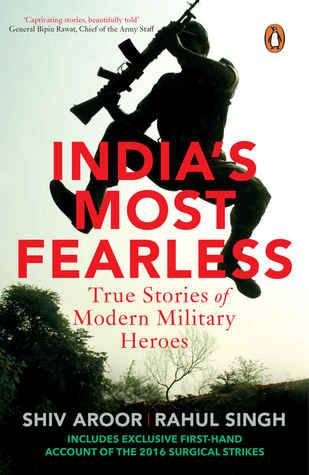More on this book
Community
Kindle Notes & Highlights
by
Shiv Aroor
Read between
December 2, 2017 - February 25, 2018
Captain Vikram Batra from Kargil; Major Kuldip Singh Chandpuri from the Battle of Longewala in 1971; the astonishing last stand of Major Shaitan Singh in 1962 . . . It would be the rare citizen who knows or recalls in any great detail the exploits of Second Lieutenant Arun Khetarpal in 1971, or Subedar Bana Singh in 1987, or even Naib Subedar Sanjay Kumar, who, like Vikram Batra, was awarded the Param Vir Chakra, but whose story remains obscure to most of us. These are stories that have fallen through the cracks, not a fraction of the
Capt. Vikram Batra’s war-cry ‘Yeh dil maange more’ during the Kargil War eased his passage into that rare public immortality.
What, after all, is a more human emotion than fear? Yet, are we to believe that these men truly felt no fear at all?
Asked what they owed their courage to, we encountered a perplexingly unanimous answer. We quote one of the men: ‘I would say I owe it to the opportunity—being in that place at that time. I think any soldier in my place would do the same.’ It’s true. Heroes walk among us.
‘Let me not pray to be sheltered from dangers, but to be fearless in facing them. Let me not beg for the stilling of my pain, but for the heart to conquer it.’ —Rabindranath Tagore
The Indian Army’s Special Forces are among the world’s only elite units permanently deployed in hostile conditions and missions in Jammu and Kashmir and the North-east. For the preservation of peace, the war
What compels a pilot to delay an ejection so he may save lives on the ground even though such a delay means certain death for him? What pushes a sailor to willingly venture into harm’s way if it means the oceans are just a fraction safer? One of Mahatma Gandhi’s lesser-known quotes perfectly captures how we in the armed forces regard acts of courage: Fearlessness is the first requisite of spirituality. Cowards can never be moral.
During his time in Kupwara, there was a discernible change in the public perception of the Army, say men who served under the Colonel. ‘Separatists from the Hurriyat would often attack Col. Mahadik through the local media or through statements issued in public,’ recalls a jawan of the 41 Rashtriya Rifles. ‘They didn’t like how he was reaching out to the locals and having an impact on their lives. They warned him to simply do his work and get out. All that never bothered him.’ Col. Mahadik’s leadership by example would become legend well beyond his unit, and has already become a touchstone of
...more


